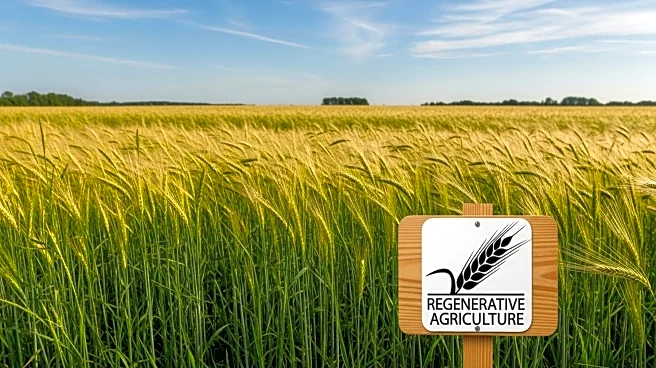What is the story about?
What's Happening?
FoodChain ID has certified Mulino Bianco’s Buongrano cookie to the Regenerative Agriculture (RGN) Standard, marking Italy’s first bakery brand to introduce a cookie certified with 100% regenerative soft wheat flour. This certification provides independent verification of regenerative outcomes, promoting practices that restore degraded soils, support biodiversity, sequester carbon, and build climate resilience. The Buongrano project, launched in 2018, aims to enhance product quality, protect biodiversity, and ensure fair recognition of farmers’ work. Mulino Bianco plans to extend regenerative soft wheat flours across all product categories by 2030.
Why It's Important?
The certification of Buongrano to the Regenerative Agriculture Standard underscores the growing importance of sustainable agricultural practices in the food industry. By adopting regenerative methods, Mulino Bianco contributes to environmental conservation and climate resilience, potentially influencing other brands to follow suit. This move aligns with global trends towards sustainability and transparency in food sourcing, offering consumers products that support ecological health. The initiative also highlights the role of certification bodies like FoodChain ID in facilitating credible sustainability claims.
What's Next?
Mulino Bianco’s commitment to expanding regenerative practices across its product lines by 2030 suggests a long-term strategy towards sustainability. As the brand progresses, it may face challenges in scaling these practices while maintaining product quality and consumer trust. The success of this initiative could encourage other food companies to adopt similar standards, potentially leading to broader industry shifts towards regenerative agriculture.
Beyond the Headlines
The adoption of regenerative agriculture practices raises ethical considerations regarding the fair treatment and compensation of farmers involved in sustainable farming. Ensuring that these practices benefit all stakeholders, including small-scale farmers, will be crucial for the long-term viability of such initiatives. Additionally, the focus on regenerative agriculture may drive innovation in agricultural technology and practices, fostering a more resilient food system.
















